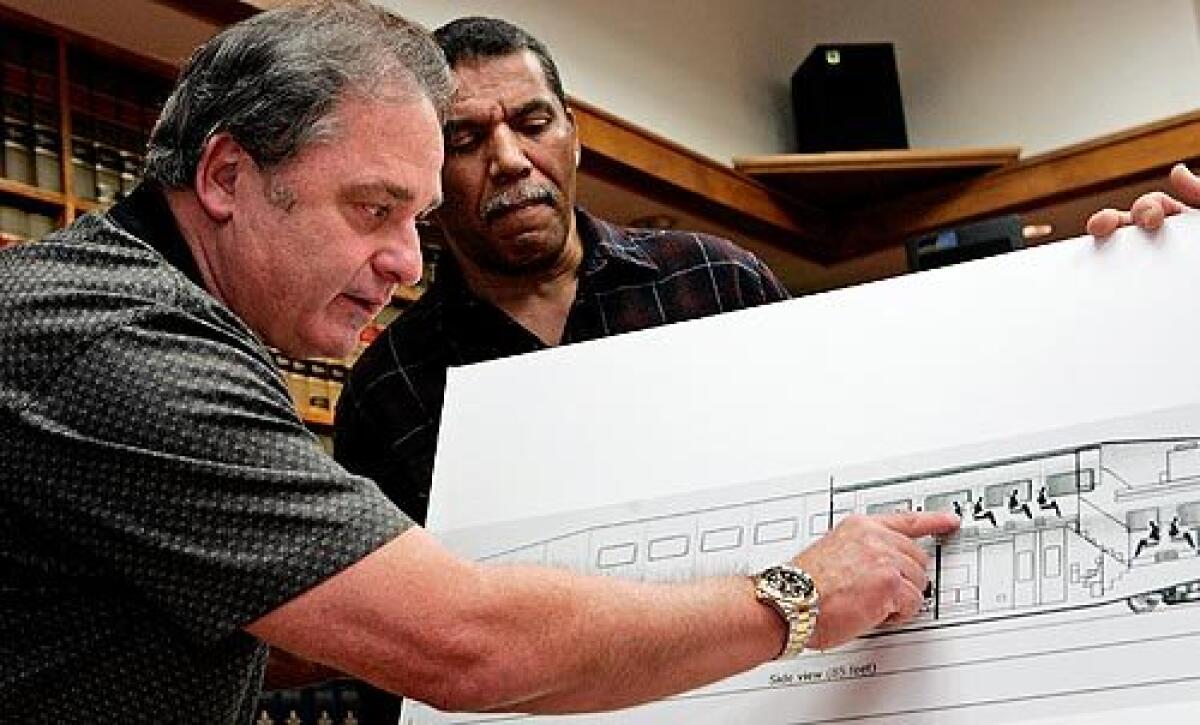Management knew about train engineer’s texting, lawyers say

- Share via
Lawyers for victims of the Chatsworth Metrolink crash alleged Tuesday that officials with the contractor that provides crewmen to the commuter rail service knew that the engineer involved in the deadly crash had a history of sending text messages while on duty.
The allegation came from an employee of Connex Railroad, which provides Metrolink with engineers and conductors. The employee, who was not identified, has told lawyers that he had complained to his superiors about the engineer using his cellphone to send text messages, according to Los Angeles attorney R. Edward Pfiester.
FOR THE RECORD:
Metrolink crash: A B1 index item referring to an article inside Wednesday’s California section about the Metrolink train crash in Chatsworth said the conductor involved in the crash was known to send text messages; it should have said the engineer, not the conductor. —
Pfiester said the employee complained to management a few days before the wreck and complained a second time to a co-worker within three hours of the crash. The lawyer acknowledged, however, that he had no documentation -- such as phone records or other written complaints -- to back the allegations.
Several months before the crash, a manager conducting a field test allegedly caught engineer Robert M. Sanchez with a cellphone in his bag. The phone was turned on, an apparent violation of Connex policy, the lawyer said.
The Sept. 12 crash killed Sanchez and 24 passengers, while injuring 135 others.
Pfiester revealed the allegations at a news conference in Los Angeles.
Connex “didn’t do anything about it,” Pfiester said.
Federal safety investigators have said Sanchez sent and received dozens of text messages from his cellphone while on duty the day of the crash -- a violation of the commuter line’s policy. The last message was sent 22 seconds before his train collided with a Union Pacific freight train that was sharing the same track, according to preliminary findings by the National Transportation Safety Board.
In a lawsuit filed two weeks ago, Pfiester alleged that Metrolink and its contractor had knowledge about engineers text messaging while at work.
They “allowed their trains to be operated by locomotive engineers who were known to be using cellphones on duty (and sending and receiving text messages), in violation of existing railroad operation rules,” according to the complaint filed in Los Angeles County Superior Court. “They also knew that . . . employees had violated railroad rules prohibiting use of cellphones while operating trains.”
A spokeswoman for Connex’s parent company, Veolia Transportation, said that the firm cannot comment about Sanchez because of the ongoing federal investigation and that it does not discuss issues involving pending litigation.
However, spokeswoman Erica Swerdlow said Veolia has “strict cellphone policies that are strongly enforced.”
The lawyers for the victims are seeking unspecified damages for past and future wage loss and medical expenses from Metrolink and Veolia.
Attorneys familiar with previous railroad accident settlements have said the damage claims are expected to exceed a $200-million cap that Congress imposed a decade ago to limit a railroad’s liability in any single accident.
Federal investigators said Sanchez, who was killed in the collision, was supposed to stop at a red signal just before a switch mechanism that was intended to guide the Union Pacific train onto a side rail.
Instead, Sanchez barreled over the switch at 42 mph before slamming into the southbound freight carrier about a quarter mile past the light, according to federal investigators. The multi-agency inquiry, which is being led by the NTSB, will take months to determine a probable cause.
More to Read
Sign up for Essential California
The most important California stories and recommendations in your inbox every morning.
You may occasionally receive promotional content from the Los Angeles Times.

![Irvine, CA - July 16: Gina Osborn, shown at her home, is the former head of Metro security is suing the agency for firing her after she filed a claim with the Inspector General. Photo taken at her home Tuesday, July 16, 2024. Gina Osborn, a former FBI agent who was the agency's first chief safety officer, "was summarily terminated by [Chief Executive] Stephanie Wiggins," said her attorney, Marc R. Greenberg. Osborn says in claims that she butted heads with Metro's CEO over security as the agency was trying to put a good face on its efforts to clean up crime and loitering. (Allen J. Schaben / Los Angeles Times)](https://ca-times.brightspotcdn.com/dims4/default/c1419ae/2147483647/strip/true/crop/5981x4000+9+0/resize/320x214!/quality/75/?url=https%3A%2F%2Fcalifornia-times-brightspot.s3.amazonaws.com%2F46%2F07%2Fa88ac0b7466895ee4e137839d93c%2F1467168-me-former-metro-security-chief-18-ajs.jpg)








